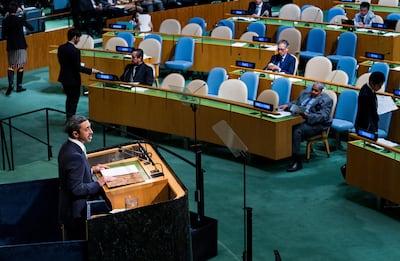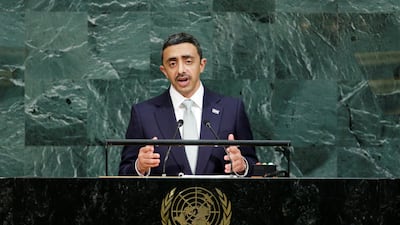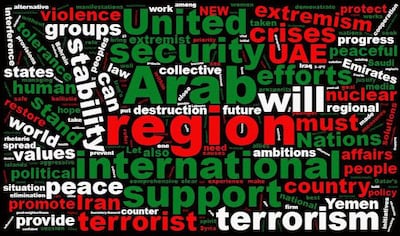Sheikh Abdullah bin Zayed, Minister of Foreign Affairs and International Co-operation, told the United Nations General Assembly that the world stands at a cross roads between modernity and extremism, forcing all states to choose sides and defend their values.
“We stand before a historic juncture,” he said. “On the one hand stand those who pursue peace, development, modernity and the future. On the other, those who choose darkness, destruction, sabotage and chaos.”
The minister told the UN body that "aggressive and expansionist" regimes that provided support for extremism and terrorist groups were trying to undermine the legitimacy of nation states. The United Arab Emirates would act against those who finance, promote, and justify these activities.
______________
You can listen to his full speech here:
______________
“Despite serious regional and international efforts, our region continues to suffer from crises. These have several causes: extremism and terrorism; continued interference by states in each other's internal affairs; aggressive and expansionist policies driven by hegemonic ambitions; and regimes which seek influence by providing support to extremist and terrorist groups to undermine legitimate governments and spread chaos and conflict throughout the region and the world."
The actions of the UAE, Saudi Arabia, Egypt and Bahrain to oppose the promotion of extremism and support of terror by Qatar was a necessary stand.
“We must demonstrate zero tolerance to those who spread violence, fear and destruction among innocent people, and those who provide support and safe haven to terrorist groups. The sovereign measures taken by my country in cooperation with its close allies serve this purpose,” he said. “They are consistent with international law and are intended to protect Arab national security and counter Qatar's support for terrorism.”
The Arab world was affected by many conflicts as a result of this type of interference and more must be done to eradicate these threats.
Sheikh Abdullah paid tribute to the world of UN mediators in conflicts in Libya, Syria, Yemen and Somalia to resolve conflict and alleviate suffering.
“There is no doubt that we, as an international community, have made progress in confronting security and humanitarian threats. However, more can be done to restore stability in the Arab world,” he said.

Recalling the first overseas trip of Donald Trump as US president, the foreign minister said the visit to Riyadh was a turning point.
“My country believes that the Riyadh Summit was historic by any standard,” he said. “It attracted an unprecedented breadth of attendance at the highest levels, including the important participation of the president of the United States. The outcomes of the summit demonstrated that the Arab and Islamic world stands firmly against terrorism and its ideological roots.”
Sheikh Abdullah welcome the push to reopen the 2015 international agreement to curb Iran’s nuclear programme. “Two years have passed since Iran's nuclear agreement, with no sign of change in its hostile behaviour in the region or any desire to abandon its nuclear ambitions. Instead, Iran continues to develop and conduct more ballistic missile tests in a deliberate violation of the spirit of the nuclear agreement. Therefore, we support enhancing controls on Iran's nuclear program and continued assessment of the agreement and its provisions.”
The obstinate rejection by the Houthis in Yemen of steps toward political settlement had pushed that country down the road of humanitarian suffering.The foreign minister also affirmed support for Myanmar Rohingya.
“The United Arab Emirates condemns the acts of violence, and displacement and collective punishment, committed against the Rohingya and affirms that it will continue to provide humanitarian assistance and support efforts taken to reduce their suffering.
_______________
Read more:
WATCH: youth group at UAE's UN mission tackle extremism
Visa free travel for UAE citizens to Pacific island Vanuatu
_______________
During his visit to New York, Sheikh Abdullah laid the cornerstone for a permanent UAE mission to the UN. He also met with a number of world foreign ministers on the sidelines of the 72nd session of the UN General Assembly.
Sheikh Abdullah's meetings included talks with Boris Johnson, British Foreign Minister, Darren A. Henfield, the Bahamas' Foreign Minister, Beatrice Jeanine Atallah, Madagascar's Foreign Minister, Angelino Alfano, Italian Foreign Minister, and Falah Mustafa Bakir, Head of the Kurdistan Regional Government Department of Foreign Relations.
During the meetings, the foreign ministers exchanged views on a series of regional and international developments of common interest, particularly those related to Yemen, Syria, Iraq and Libya, which are on the agenda of the UN meeting.
The meetings were attended by Dr. Sultan bin Ahmad Sultan Al Jaber, Minister of State, Suleiman Hamed Salem Al Mazrouei, UAE Ambassador to the United Kingdom, and Lana Nusseibeh, Ambassador and Permanent Representative of the UAE to the United Nations.


